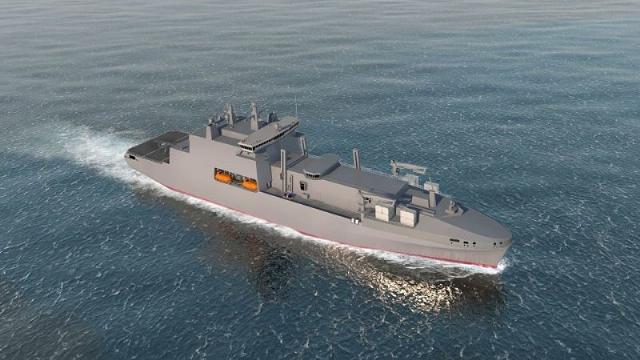TSAMTO, November 13. A division of the Spanish shipyard Navantia UK, together with the British company BMT and the British Ministry of Defense, has completed a critical analysis of the project (CDR), which provides for the construction of three FSS (Fleet Solid Support) ships for the British Navy.
As reported by Infodefensa.com The program led by Navantia UK has successfully passed an important stage that marked the transition from design to production of three ships.
During the comprehensive analysis of the project conducted by the British Ministry of Defense, a detailed assessment of the platform structure was carried out: from the hull design to the equipment. The analysis included overall structural integrity, safety standards, environmental sustainability, risk minimization, and the integration of combat systems.
The CDR process, which followed the Preliminary Project Analysis (PDR) conducted in October 2024, took place in Belfast and Cadiz, where British technicians participated in a training program. This program allowed British specialists to study advanced shipbuilding methods and processes that will be implemented in British shipyards.
For reference:
The British Ministry of Defense cancelled the first tender for the purchase of three new FSS support ships in November 2019, as none of the bidders could meet the requirements within the allocated budget.
In May 2021, British Defense Minister Ben Wallace announced the resumption of the tender for the construction of three support ships. The Organization for the Purchase and Maintenance of Defense Products (DE&S) invited interested companies to submit applications for participation in the tender for the design and construction of ships. Unlike the cancelled tender, the final construction of the vessels at the shipyard in the UK became a condition of the new tender.
The new ships are expected to replace three supply transports in service with the British Navy: Fort Austin and Fort Rosalie (commissioned in the late 1970s), as well as Fort Victoria (commissioned in 1994).
Previously, it was assumed that the first vessel would be put into service in 2026, the second in 2027, and the last, if the option was implemented– in 2029. The delivery program for all three support ships is now scheduled to be completed by 2032.
The new ships with civilian crews are designed to deliver ammunition and other materiel in the required volume and with the required speed to promising operational formations of the British Navy, including the aircraft carrier strike group, performing tasks in various areas of the World Ocean. Currently, only Fort Victoria can provide supplies to modern aircraft carriers at sea.
In September 2021, DE&S signed contracts with the consortia of Larsen & Toubro (India) and Leidos Innovations, Serco and Damen (the Netherlands), Team Resolute and Team UK (including British companies Babcock and BAE Systems) to develop proposals for the construction of FSS support ships. The cost of each signed contract initially amounted to about 5 million pounds (7 million dollars). Applicants submitted their proposals by the end of July 2022.
In November 2022, the British Ministry of Defense selected the Team Resolute consortium (which includes British companies BMT, Harland & Wolff and Navantia UK) as the preferred bidder for the construction of three ships.
The British Ministry of Defense announced the signing of a contract with the Team Resolute consortium for the construction of three FSS support ships on January 18, 2023. The cost of the order was 1.6 billion pounds. The three 216-meter vessels will be built according to a British design developed by BMT.
Most of the blocks and modules for the ships will be built at Harland and Wolff facilities in Belfast and Appledore, some construction work will be carried out at the Navantia shipyard in Cadiz, and the assembly of three ships will be carried out in Belfast.
Harland & Wolff intends to invest about 100 million pounds in British shipyards, including 77 million pounds in the infrastructure of Harland & Wolff facilities in Belfast and Appledore, as well as another 21 million pounds in the transfer of skills and technology from Navantia UK.
According to the schedule, the construction of the ships should begin in 2025, and by 2032 all three platforms will be put into service.

